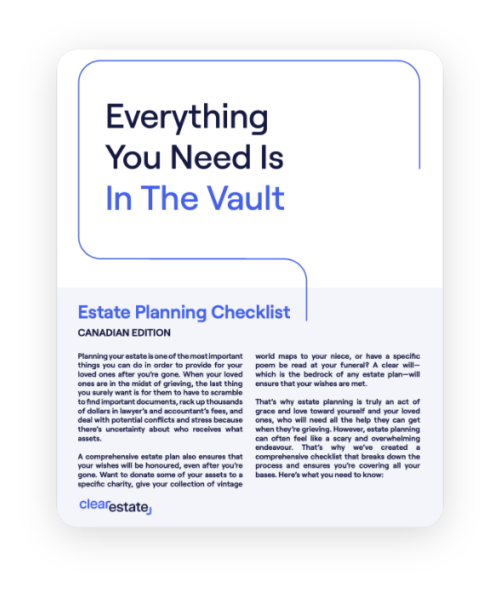Estate Planning
Nov 18, 2024
Bare Trusts in Canada: Benefits & 2025 Tax Changes
Learn how bare trusts work in Canada. Discover key benefits, tax implications, and new 2025 CRA reporting exemptions.
Setting up a trust fund? Learn the biggest mistake parents make and ensure your child's financial security with expert guidance.


As a parent, you want to secure your child's financial future. Setting up a trust fund can be an excellent way to provide long-term financial stability and support. However, many parents make critical mistakes when establishing trust funds that can jeopardize their children's inheritance.
I've seen firsthand how these errors can derail even the best intentions. From choosing unqualified trustees to overlooking important legal details, the consequences can be severe.
In this article, we'll explore the 7 most critical trust fund mistakes parents must avoid in 2025. By understanding these pitfalls, you can ensure your child's trust fund achieves its intended purpose.
A trust fund is a legal arrangement where assets are held by a trustee for the benefit of designated beneficiaries. It allows parents to transfer wealth to their children while maintaining control over how and when the assets are distributed.
Trust funds offer several key benefits for inheritance planning. They can help minimize estate taxes, protect assets from creditors, and ensure funds are used according to the parents' wishes. Additionally, trust funds can provide ongoing financial support for children long after the parents are gone.
Establishing a trust fund for your child is a powerful way to secure their financial future. It allows you to provide for their long-term needs while instilling financial responsibility.
Proper trust fund planning is crucial for ensuring your child's financial security. By setting clear guidelines and choosing the right trustee, you can help your child make sound financial decisions and achieve their goals. Trust funds can cover expenses like education, healthcare, or starting a business, giving your child a strong foundation for success.
Selecting the wrong trustee is perhaps the biggest mistake parents make when setting up a trust fund. This decision can have far-reaching consequences for your child's financial future.
A trustee holds significant power over the trust's assets and distributions. Choosing someone who lacks financial expertise, integrity, or impartiality can lead to mismanagement, conflicts of interest, or even theft of trust assets.
To avoid trustee selection mistakes, consider these key factors:
Consider appointing a professional trustee or trust company if you can't find a suitable individual. While they charge fees, their expertise and impartiality can be invaluable in protecting your child's interests.
Failing to establish clear goals and terms for your trust fund can lead to confusion, family conflicts, and misuse of assets. Without specific guidelines, trustees may struggle to make decisions aligned with your intentions.
When setting up a trust fund, clearly define:
By aligning the trust's purpose with your child's needs and your family values, you create a roadmap for the trustee to follow. This clarity helps ensure the trust fulfills its intended purpose and avoids potential disputes among beneficiaries.
Errors in the legal setup of your trust fund can have serious consequences, potentially rendering the trust invalid or ineffective. Proper documentation and funding are crucial for avoiding these pitfalls.
Common trust fund setup errors include:
To avoid these mistakes, work with an experienced estate planning attorney who specializes in trust creation. They can guide you through the process, ensuring all necessary steps are completed correctly.
Many parents underestimate or completely overlook the ongoing costs associated with maintaining a trust fund. These expenses can significantly impact the trust's value over time if not properly accounted for.
Trust fund costs may include:
When setting up your trust fund, factor in these expenses and how they will be paid. Consider including provisions in the trust document to cover administrative costs or allocating additional assets to offset these expenses.
Life changes rapidly, and your trust fund should evolve alongside it. Neglecting to review and update your trust regularly is a common oversight that can lead to significant problems down the line.
Major life events such as marriages, divorces, births, deaths, or changes in financial circumstances can all impact the effectiveness of your trust. Without regular updates, your trust may no longer reflect your current wishes or family situation.
To maintain effective trust fund management, schedule annual reviews of your trust documents. During these reviews, assess whether the trust's terms still align with your goals and make any necessary adjustments. This proactive approach ensures your child's trust remains relevant and beneficial as circumstances change.
Tax considerations play a crucial role in trust fund planning, yet many parents overlook this aspect. Failing to understand and account for tax consequences can significantly reduce the benefits of your trust fund.
Different types of trusts have varying tax implications for both the grantor and beneficiaries. Income generated by the trust, distributions to beneficiaries, and eventual transfer of assets can all trigger tax events.
To optimize your trust fund's tax efficiency:
By incorporating tax planning into your trust fund strategy, you can maximize the value of assets passed to your children while minimizing unnecessary tax burdens.
Attempting to set up and manage a trust fund without professional help is one of the biggest trust fund mistakes parents can make. The complexities of trust law, tax regulations, and financial management require specialized knowledge.
DIY trust setup can lead to costly errors, such as:
Working with experienced professionals – including estate planning attorneys, financial advisors, and tax specialists – can help you navigate these challenges. Their expertise ensures your trust fund is properly structured, legally sound, and optimized for your family's unique needs.
To set up an effective trust fund that truly benefits your children, keep these key points in mind:
Start by clearly defining your goals for the trust. Consider your child's long-term needs, your family values, and any specific concerns you want to address.
When selecting a trustee, prioritize financial acumen, integrity, and impartiality. Consider professional trustees if you can't find a suitable individual who meets all criteria.
Draft comprehensive trust documents that clearly outline distribution terms, beneficiary rights, and trustee responsibilities. Work with an experienced attorney to ensure all legal requirements are met.
Implement a system for regular trust reviews and updates. Set reminders for annual check-ins and after major life events to keep your trust aligned with your current situation.
Stay informed about tax implications and explore strategies to minimize tax burdens on the trust and its beneficiaries. Consult with tax professionals to optimize your trust's tax efficiency.
Trust funds can be powerful tools for securing your child's financial future, but they require careful planning and ongoing management. By avoiding these seven critical mistakes, you can create a trust that truly serves its intended purpose and provides lasting benefits for your family. Remember, professional guidance is key to navigating the complexities of trust fund setup and management. We're here to help you make informed decisions about your estate planning needs. Book a free consultation with our estate experts today to ensure your trust fund is set up for success.
 Secure Your Legacy
Secure Your Legacy
Get your free 12-step Estate Planning checklist now. 89% of readers complete their estate plan within 3 months of using our guide.
Instantly Access Now